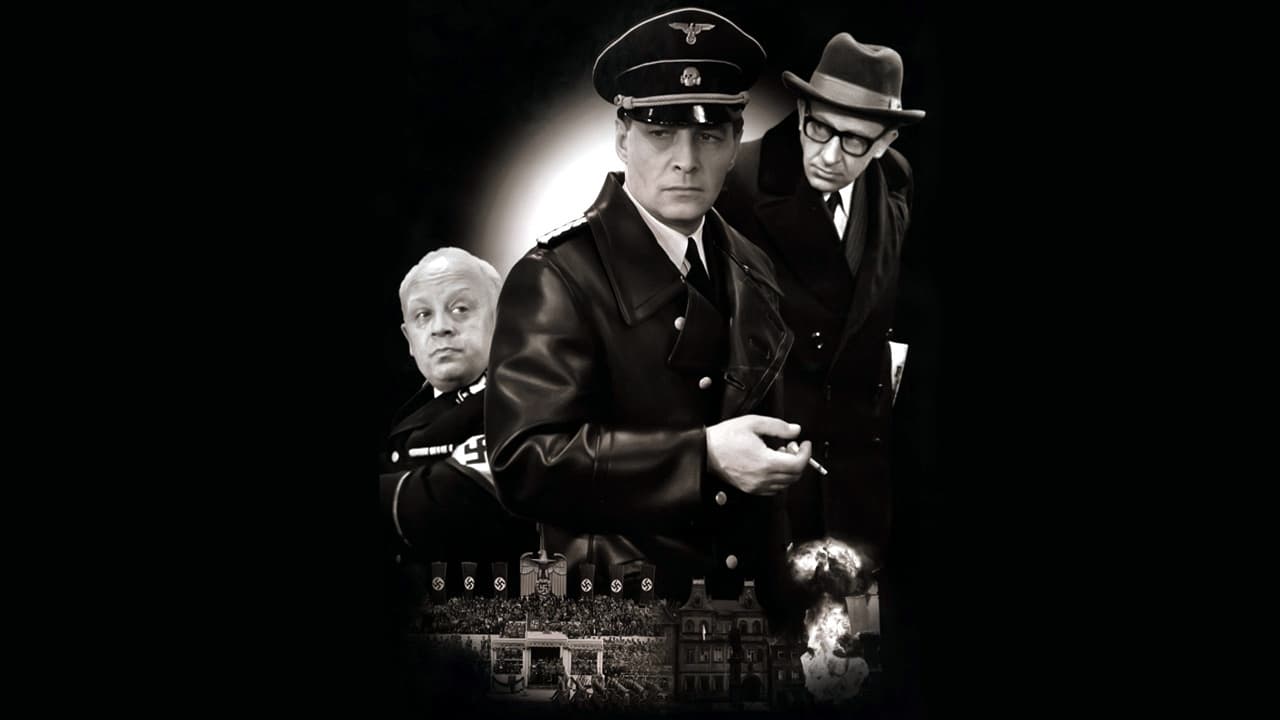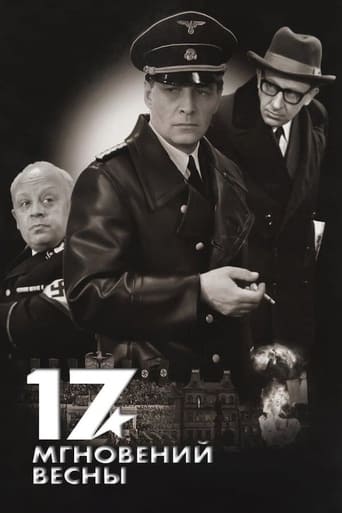

Highly Overrated But Still Good
... View MoreIt's hard to see any effort in the film. There's no comedy to speak of, no real drama and, worst of all.
... View MoreExcellent and certainly provocative... If nothing else, the film is a real conversation starter.
... View MoreIt is encouraging that the film ends so strongly.Otherwise, it wouldn't have been a particularly memorable film
... View MoreWell, I thought this was a fantastic production - very engrossing, with excellent performances, artistic direction, and intelligent scripts. It's a great example of how a television mini-series, as a format, can bring a novelistic type of depth of story and character to the screen. And it's easy to see why it's still so iconic in Russia. By any technical definition, this particular series is propaganda -- it was ordered specifically by the Soviet government in order to interest more young people in the spy service. Any maybe it did. But "Seventeen Moments of Spring" acts in a way that's completely opposite to the propaganda usually works. Instead of simplifying issues and making them into easy black-and-white decisions, this series complicates them -- dwelling on the difficulty of the heroes' decisions, and taking care to imbue the Geramans with more humanity rather than less. It's notable and, I think, key to the series' success that the centerpiece of each episode consists of one or two long, tense, subtle dialogue-heavy scenes. The contrast of the action-oriented expectations from the subject of spies and war with the tense character drama that we see is excellent. The integration of real footage from the war and cameos from other major players are really well-apportioned, and give the character scenes that we're watching more importance to us for our having been reminded of their contextual importance. The music is about perfect as well, helping to set the tone. In all, it's a spy drama who main modes are subtle, thoughtful melancholy in the foreground, with the element of constant danger tinging it from the background. In that, it's tone is unexpected and very successful. More than worth watching, even for those who don't normally go in for war or spy films.
... View More'Seventeen Moments of Spring' is a 1973 Soviet twelve-part television mini-series, based on the novel of the same title by Yulian Semyonov.The series was immensely popular in the Soviet Union, and during its first showing, city streets would empty. It attracted greater audiences than hockey matches and crime rates dropped significantly during the broadcasts. Leonid Brezhnev was a devoted fan. The character of Stirlitz became the Soviet James Bond.In early 1945, while Adolf Hitler (Fritz Diez) is determined to continue the war, Walter Schellenberg (Oleg Tabakov), his head of foreign intelligence, has convinced Heinrich Himmler (Nikolai Propkovich) to conduct secret negotiations with the Americans, aimed at forging a separate peace between Germany and the Western Allies, which would allow the Germans to concentrate all their forces on the Eastern Front. Maksim Isaev (Vyacheslav Tikhonov), a Soviet spy who has infiltrated the Nazi Party in Germany under the name Stirlitz, is tasked with disrupting the negotiations between the German general Karl Wolff (Vasily Lanovoy) and the American diplomat Allen Dulles (Vyacheslav Shalevich) taking place in Switzerland. He is ordered by Moscow to ascertain whether the Americans and the Germans have a secret channel of communication, and if so - to obstruct it.He recruits two aides - Professor Pleischner (Yevgeniy Yevstigneyev), a former member of the German Resistance, and Pastor Schlag, (Rostislav Plyatt) a clergyman who disapproves of the regime.Stirlitz succeeds in leaking the details of the negotiations both to Hitler and to Stalin (Andro Kobaladze). The Soviets, now possessing evidence, demand an end to those contacts and President Roosevelt obliges them. Himmler narrowly convinces Hitler it was all merely an attempt to sow distrust between the Allies.
... View MoreThis series are far greater than anything that has been filmed about war ever. It shows closely characters of German Nazi top during the last weeks of the war, when they understand that the war is lost. A Russian spy is working among them speeding up the war's end.The pace of the film is slow and thorough, the movie is meant for people with ability to analyze, reflect. Characters of the people involved are depicted are so lively that the film fuses with the documentary pieces. Acting is extremely raw and natural, it actually in't acting, it's living. Tihonov in a role of Stirlitz portrays a real spy - brilliantly talented, sharp, calm, cold, patient - everything that areal spy has to be. At the same time he is not a greedy adventurous coat-turner, he works for his country, his people, his family. And the last - this film works as a litmus test on people. If you don't understand it you simply haven't matured for it. The film itself is flawless.
... View MoreI've seen this movie a lot of times and year after year I have a strong desire to watch it again. The story never ends. I got addicted to it as millions of Russians did. The war still means a lot to me. The movie spins the brain in the right direction. The best war series ever seen. Nothing to compare with the modern blockbusters. Totally different athmospere and completely different result. Simply the best.
... View More